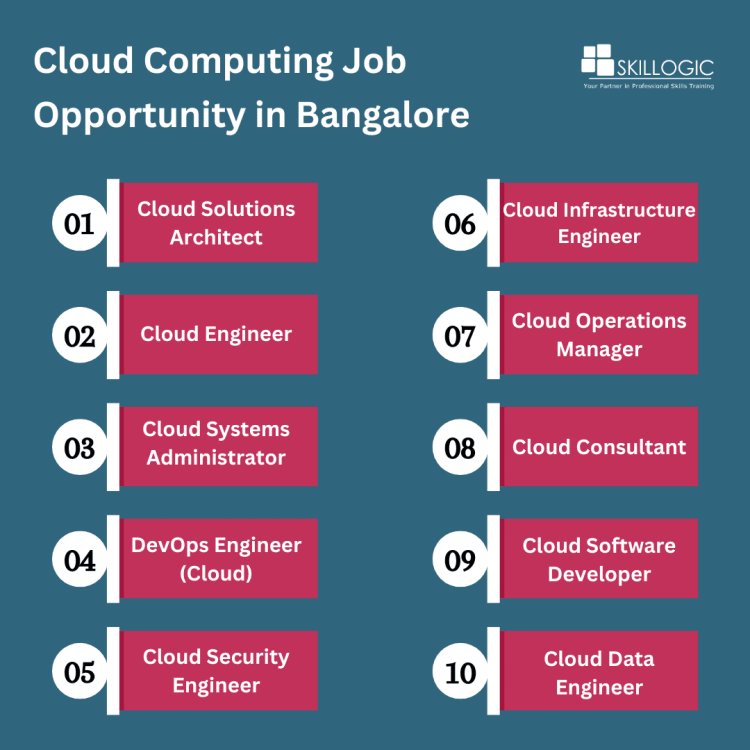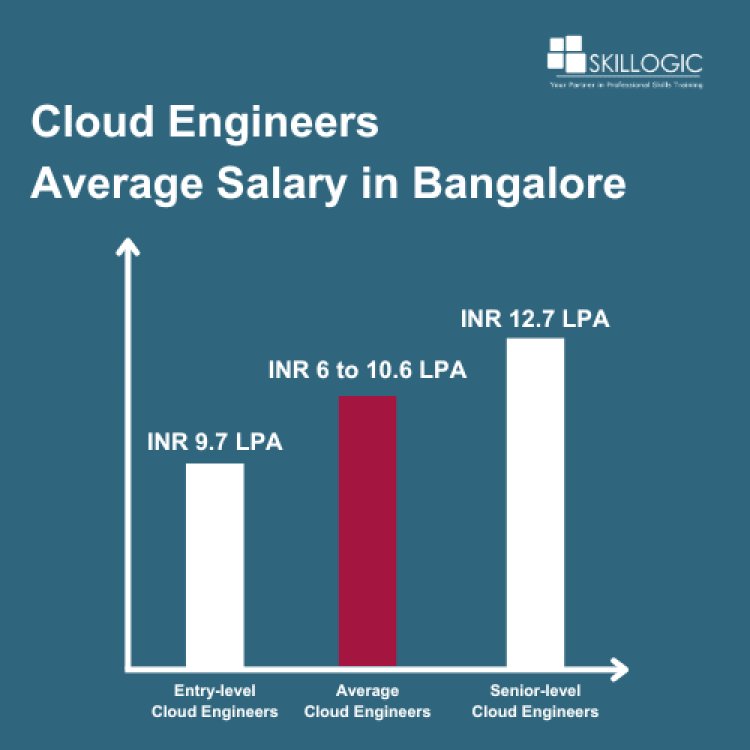Cloud Computing Scope in Bangalore
Bangalore, India’s tech capital, offers immense career opportunities in cloud computing across IT, startups, and global enterprises. With a growing demand for cloud professionals, the city provides a booming ecosystem for innovation and skill development.

In today's digital age, where innovation and efficiency are paramount, cloud computing has emerged as a transformative force across industries worldwide. Bangalore, often referred to as the Silicon Valley of India, stands at the forefront of technological advancement and has embraced cloud computing with open arms.
During the forecast period, the cloud computing market is expected to expand from $676.29 billion in 2024 to $2,291.59 billion by 2032, demonstrating a compound annual growth rate (CAGR) of 16.5% according to Fortune Business Insight report. As businesses in Bangalore continue to evolve, understanding the vast scope of cloud computing becomes imperative for professionals and organizations alike.
Understanding Cloud Computing:
At its core, cloud computing involves the delivery of computing services—including servers, storage, databases, networking, software, and analytics—over the internet (the cloud) to offer faster innovation, flexible resources, and economies of scale.
According to a Precedence Research report, the worldwide market size for cloud services reached USD 454.20 billion in 2022, and it is projected to reach approximately USD 2192.54 billion by 2032. This represents a compounded annual growth rate (CAGR) of 17.10% from 2023 to 2032.
Instead of owning and maintaining physical data centers and servers, businesses can access computing resources on-demand from cloud providers like Amazon Web Services (AWS), Microsoft Azure, and Google Cloud Platform (GCP).
Refer:
- Cloud Computing - The Basics
- The Perks of Using GCP - What You Need to Know
- A Simple Guide to Amazon Web Services (AWS)
- AWS vs Azure vs GCP - Which One Do You Prefer?
Importance of Cloud Computing in Bangalore
Cloud computing has significant importance in Bangalore, India, just as it does in many other parts of the world. Here are some reasons why cloud computing is particularly significant in Bangalore:
- Technology Hub: Bangalore is commonly known as the Silicon Valley of India. It's home to numerous multinational technology companies, startups, and research institutions. Cloud computing plays a vital role in the technological ecosystem of the city by providing scalable and cost-effective infrastructure for innovation and development.
- Startup Ecosystem: Bangalore has a thriving startup ecosystem with thousands of startups spanning various industries, including technology, e-commerce, healthcare, and finance. Cloud computing offers startups the flexibility to quickly scale their operations without heavy upfront investment in physical infrastructure. It enables them to focus more on developing their products and services rather than managing IT infrastructure.
- IT Services Industry: Bangalore is a major hub for the IT services industry, with numerous IT outsourcing companies serving clients worldwide. Cloud computing allows these companies to deliver services more efficiently, reduce costs, and provide scalable solutions to their clients. It also enables them to adopt emerging technologies such as artificial intelligence, machine learning, and big data analytics more easily.
- Digital Transformation: Many traditional businesses in Bangalore are undergoing digital transformation to stay competitive in the digital age. Cloud computing provides the foundation for this transformation by offering agility, scalability, and innovation capabilities. It allows businesses to modernize their IT infrastructure, adopt new technologies, and deliver digital services to customers more effectively.
- Education and Research: Bangalore is home to prestigious educational institutions and research organizations focused on technology and innovation. Cloud computing provides these institutions with access to powerful computing resources for research, experimentation, and collaboration. It facilitates interdisciplinary research in areas such as data science, cybersecurity, and advanced computing.
Demand for Cloud Computing in Bangalore
The demand for cloud computing in Bangalore has surged exponentially across various sectors. Here's an overview of how different industries are leveraging cloud computing in the tech hub of Bangalore:
Information Technology (IT) Services:
- Bangalore, known as the Silicon Valley of India, hosts numerous IT service companies that are at the forefront of adopting cloud technologies.
- Cloud computing offers scalability, flexibility, and cost-effectiveness, allowing IT firms to rapidly deploy and manage applications for their clients.
- Services such as infrastructure as a service (IaaS), platform as a service (PaaS), and software as a service (SaaS) are in high demand among IT service providers.
Startups and Technology Companies:
- Bangalore's vibrant startup ecosystem heavily relies on cloud computing to launch innovative products and services.
- Cloud platforms provide startups with the necessary infrastructure and tools to develop, test, and deploy their solutions without significant upfront investment in hardware.
- Startups benefit from the agility and scalability offered by cloud services, enabling them to quickly adapt to changing market demands and scale their operations as they grow.
E-commerce and Retail:
- With the proliferation of e-commerce platforms and online retail stores, there is a growing need for robust and scalable infrastructure to handle large volumes of transactions.
- Cloud computing enables e-commerce companies to manage their websites, inventory, and customer data efficiently while ensuring high availability and performance during peak traffic periods.
- Additionally, cloud-based analytics and machine learning services empower retailers to gain insights into consumer behavior, optimize pricing strategies, and personalize the shopping experience.
Healthcare and Life Sciences:
- Healthcare organizations in Bangalore are increasingly adopting cloud computing to streamline operations, enhance patient care, and drive medical research and innovation.
- Cloud-based electronic health record (EHR) systems allow healthcare providers to securely store and access patient information from anywhere, improving the efficiency of clinical workflows.
- Furthermore, cloud platforms facilitate collaboration among researchers and enable the analysis of large datasets to accelerate drug discovery, genomics research, and precision medicine initiatives.
Financial Services:
- Banks, insurance companies, and fintech startups in Bangalore are leveraging cloud computing to modernize their IT infrastructure, enhance security, and deliver digital banking and financial services.
- Cloud-based banking platforms enable financial institutions to introduce new products and services rapidly, improve customer engagement through mobile and online channels, and comply with regulatory requirements.
- Moreover, cloud-based analytics and artificial intelligence (AI) solutions help financial firms detect fraudulent activities, manage risks, and personalize financial advice for their clients.
Refer:
- How can one pursue a career as a Cloud Computing Engineer in India?
- How much is Cloud Computing Course Fee in India?
Benefits of Cloud Computing in Bangalore
- Cloud computing in Bangalore offers numerous benefits to businesses and individuals as it does elsewhere. Below are some of the primary benefits:
- Scalability: Bangalore is a hub for startups and tech companies that often experience rapid growth. Cloud computing allows businesses to easily scale up or down their IT infrastructure and resources based on demand without the need for heavy upfront investments in physical hardware.
- Cost-effectiveness: Cloud computing negates the necessity for organizations to invest in and upkeep costly hardware and software infrastructure. Instead, they can opt for subscription-based models and pay only for the resources they use, resulting in significant cost savings.
- Flexibility and Mobility: Cloud computing enables employees to access data and applications from anywhere with an internet connection, fostering remote work and enabling collaboration among teams spread across different locations. This flexibility is particularly valuable in a city like Bangalore, where traffic congestion can make commuting challenging.
- Improved Collaboration: Cloud-based collaboration tools such as Google Workspace, Microsoft 365, and Slack allow teams to work together on documents, projects, and tasks in real-time, enhancing productivity and efficiency.
- Disaster Recovery and Business Continuity: Bangalore, like many other cities, is susceptible to natural disasters and other disruptions that can disrupt business operations. Cloud computing offers robust disaster recovery solutions, with data being stored remotely in secure data centers and regularly backed up, ensuring that businesses can quickly recover and resume operations in the event of a disaster.
- Enhanced Security: Cloud service providers make substantial investments in security measures to safeguard the data stored on their platforms. By leveraging the expertise and resources of these providers, businesses in Bangalore can enhance their security posture and better protect sensitive information from cyber threats.
- Innovation and Agility: Cloud computing enables businesses to rapidly deploy new applications and services, allowing them to stay ahead of the competition and quickly respond to changing market conditions. This agility is essential in Bangalore's fast-paced and highly competitive business environment.
- Environmental Sustainability: By reducing the need for on-premises hardware, cloud computing can help organizations in Bangalore reduce their carbon footprint and minimize energy consumption, contributing to environmental sustainability efforts.
Cloud computing job opportunity in Bangalore
The expansion of cloud computing in India has led to a surge in the need for proficient individuals across diverse roles associated with cloud technology.
Here's an overview of some common cloud computing job opportunities in Bangalore.
- Cloud Solutions Architect: This role involves designing and implementing cloud-based solutions for businesses, considering factors like scalability, security, and cost-effectiveness. Solutions architects work closely with stakeholders to understand requirements and develop strategies for leveraging cloud services effectively.
- Cloud Engineer: Cloud engineers are responsible for building, deploying, and maintaining cloud infrastructure. They work with various cloud platforms such as AWS, Azure, or Google Cloud to design and implement solutions that meet the organization's needs. This role involves tasks like provisioning resources, optimizing performance, and troubleshooting issues.
- Cloud Systems Administrator: Cloud systems administrators manage and maintain cloud-based systems and services. They handle tasks like configuration, monitoring, and performance tuning to ensure the reliability and availability of cloud infrastructure. This role also involves implementing security measures and ensuring compliance with industry standards.
- DevOps Engineer (Cloud): DevOps engineers focus on automating and streamlining the development, deployment, and operations processes in a cloud environment. They utilize tools and practices like continuous integration/continuous deployment (CI/CD), infrastructure as code (IaC), and containerization to improve efficiency and agility.
- Cloud Security Engineer: With a growing emphasis on security in the cloud, cloud security engineers play a crucial role in protecting data and resources from threats and vulnerabilities. They design and implement security controls, monitor for security incidents, and ensure compliance with regulatory requirements.
- Cloud Infrastructure Engineer: This role involves designing, building, and optimizing cloud infrastructure components such as networks, storage, and compute resources. Cloud infrastructure engineers collaborate with other teams to architect scalable and resilient cloud environments that support business objectives.
- Cloud Operations Manager: Cloud operations managers oversee the day-to-day management of cloud environments, ensuring smooth operations and efficient resource utilization. They may be responsible for capacity planning, performance monitoring, and budget management, as well as leading teams of cloud professionals.
- Cloud Consultant: Cloud consultants provide expert guidance to organizations on cloud adoption strategies, migration planning, and optimization of cloud services. They assess business requirements, evaluate cloud solutions, and provide recommendations to optimize performance, cost, and security.
- Cloud Software Developer: Cloud software developers specialize in building and deploying applications that run in cloud environments. They leverage cloud-native technologies and platforms to develop scalable, resilient, and cost-effective solutions that meet business needs.
- Cloud Data Engineer: Cloud data engineers focus on managing and analyzing data in the cloud, leveraging services like data storage, processing, and analytics. They design data pipelines, implement data integration solutions, and optimize data workflows to support analytics and decision-making.

Cloud Computing Scope in Bangalore
Bangalore, India, has been a significant hub for the IT industry, including cloud computing. The scope for cloud computing in Bangalore is substantial, driven by several factors:
- IT Hub: Bangalore is often referred to as the Silicon Valley of India, hosting numerous multinational technology companies, startups, and IT service providers. These organizations heavily rely on cloud computing services for scalability, flexibility, and cost-effectiveness.
- Skilled Workforce: Bangalore boasts a large pool of skilled IT professionals, including cloud architects, developers, and administrators. Many professionals in Bangalore are well-versed in cloud technologies, making it an attractive location for companies seeking talent in this field.
- Start-up Ecosystem: Bangalore has a vibrant start-up ecosystem, with many emerging companies focusing on cloud-based solutions. These start-ups often innovate and disrupt traditional industries by leveraging cloud computing to build scalable and agile products and services.
- Enterprise Adoption: Enterprises across various sectors in Bangalore are increasingly adopting cloud computing solutions to modernize their IT infrastructure, improve agility, and reduce operational costs. This trend is expected to continue as more organizations recognize the benefits of cloud technology.
- Cloud Service Providers: Major cloud service providers such as Amazon Web Services (AWS), Microsoft Azure, and Google Cloud Platform have a significant presence in Bangalore, offering a wide range of cloud services to businesses of all sizes.
- Education and Training: Bangalore hosts numerous educational institutions and training centers offering courses and certifications in cloud computing. This ensures a continuous supply of skilled professionals to meet the growing demand in the industry.
Cloud Computing Career in Bangalore: A Guide
Starting a career in cloud computing in Bangalore can be an excellent choice considering the city's thriving tech industry and its reputation as the Silicon Valley of India. Here's a comprehensive guide to help you kickstart your career in cloud computing in Bangalore:
- Understand the Basics: Cloud computing is a vast field encompassing various services such as Infrastructure as a Service (IaaS), Platform as a Service (PaaS), and Software as a Service (SaaS). Make sure you have a solid understanding of these concepts and how they are applied in real-world scenarios.
- Gain Relevant Skills and Certifications: Acquire the necessary skills and certifications to make yourself marketable in the field. Some essential skills include proficiency in cloud platforms like Amazon Web Services (AWS), Microsoft Azure, and Google Cloud Platform (GCP), along with programming languages like Python, Java, or C#.
- Complete Certifications: Consider pursuing certifications offered by cloud service providers such as AWS Certified Solutions Architect, Microsoft Certified Azure Administrator, or Google Cloud Certified Professional Cloud Architect. These certifications validate your expertise and can significantly boost your credibility in the job market.
- Build Practical Experience: Hands-on experience is crucial in cloud computing. Consider working on personal projects or contributing to open-source projects to gain practical exposure. Additionally, internships or entry-level positions can provide valuable experience and insights into real-world cloud deployments.
- Networking: Networking is essential for career growth. Attend tech meetups, conferences, and workshops related to cloud computing in Bangalore. Engage with professionals in the field, seek mentorship, and leverage online platforms like LinkedIn to expand your professional network.
- Stay Updated: Cloud computing is a rapidly evolving field with new technologies and trends emerging frequently. Stay updated with the latest advancements, industry news, and best practices through online resources, blogs, and forums.
- Prepare for Interviews: Practice common interview questions related to cloud computing concepts, architectures, and specific technologies. Be prepared to showcase your problem-solving skills and ability to design scalable and cost-effective cloud solutions.
- Explore Job Opportunities: Bangalore offers a plethora of job opportunities in cloud computing across various industries. Utilize job portals, company websites, and professional networks to explore job openings. Customize your resume and cover letter to emphasize your pertinent skills and experiences.
Refer:
- How to become a Cloud Computing Engineer in Bangalore?
- How to become a Cloud Computing Engineer in Chennai?
- How to become a Cloud Computing Engineer in Pune?
Cloud Engineers Salary in Bangalore
Salaries for Cloud Engineers in Bangalore, India, varied based on experience levels and the specific company. However, here are approximate figures for entry-level, average, and senior salaries:
Entry-level Cloud Engineer Salary:
Entry-level cloud engineers salary in Bangalore typically earn between INR 9,76,000 per annum according to a Glassdoor report. This range can vary based on factors such as the candidate's educational background, certifications, and any relevant internships or prior experience.
Average Cloud Engineer Salary:
The average salary for Cloud Engineers in Bangalore is around INR 6,00,000 to INR 10,68,976 per annum according to an Indeed report. This figure may vary depending on the size and reputation of the company, as well as the engineer's skills and experience.
Senior Cloud Engineer Salary:
Senior cloud engineers salary in Bangalore can expect to earn between INR 12,70,000 per year according to a Glassdoor report. Salaries at this level are often influenced by factors such as leadership responsibilities, specialized skills (e.g., AWS, Azure, Google Cloud), and the ability to architect complex cloud solutions.

Bangalore holds immense potential for cloud computing with its thriving tech ecosystem, robust infrastructure, and pool of skilled professionals. As businesses increasingly adopt cloud solutions for scalability and efficiency, Bangalore stands as a key hub for innovation and growth in the cloud computing industry. With continuous advancements and evolving demands, the future of cloud computing in Bangalore appears promising, paving the way for continued expansion and opportunities in this dynamic sector.
SKILLOGIC Institute stands out as a leading provider of cloud computing training in Bangalore, delivering an extensive array of courses designed to elevate professional competencies. Their curriculum encompasses AWS (Amazon Web Services) programs, GCP (Google Cloud Platform) instruction, and Microsoft Azure certification pathways. Moreover, SKILLOGIC offers specialized training in ethical hacking, business analytics, project management, DevOps, cyber security, and Six Sigma, catering comprehensively to various career trajectories and ambitions.
SKILLOGIC Training Institute is a premier provider of professional training programs, committed to skill enhancement and career advancement. With over a decade of experience, it offers certification courses in high-demand fields like AWS, Six Sigma, PMP, Cybersecurity, and Business Analytics. With training centers in key cities such as Bangalore, Chennai, Pune, and Hyderabad, SKILLOGIC delivers accessible and high-quality learning opportunities across India.

0
498